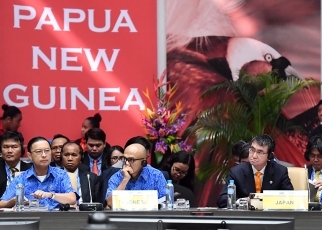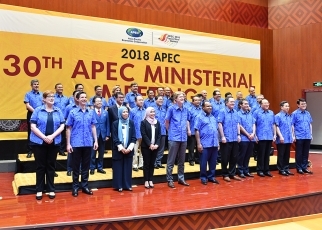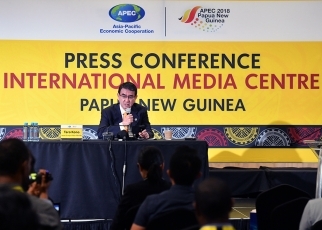Asia-Pacific Economic Cooperation (APEC)
2018 APEC Ministerial Meeting in Port Moresby, Papua New Guinea



The APEC Ministerial Meeting was held on November 15 (Thursday) in Port Moresby, Papua New Guinea, under the chairmanship of Hon. Rimbink Pato, Minister for Foreign Affairs and Trade of the Independent State of Papua New Guinea, and Mr. Taro Kono, Minister for Foreign Affairs and Mr. Hiroshige Seko, Minister of Economy, Trade and Industry attended representing Japan.
1. Schedule
November 15
2. Summary of Discussions and Mr. Kono’s Statement
(1) Discussions at the Plenary Sessions
A. Session1: Improving Connectivity, Deepening Regional Economic Integration
Discussions were held on subjects such as APEC’s role in regional economic integration, strengthening the multilateral trading system and other issues.
B. Session 2: Promoting Sustainable and Inclusive Growth through Structural Reform
Discussions were held on subjects such as promoting sustainable, innovative and inclusive growth, and enhancing inclusive growth through structural reform.
(2) The following is a summary of Mr. Kono’s statement
A. The Asia-Pacific region, which has enjoyed prosperity through the liberalization of trade and investment and through enhanced connectivity, is the core of the free and open Indo-Pacific that Japan is promoting. Japan will continue to promote trade liberalization and strengthen free and open order to ensure that the Asia-Pacific remains the world’s growth center.
B. It is imperative for us to promote global trade steadily through the rules-based multilateral trading system(MTS) with the WTO at its center. We should support the MTS and work together to improve the WTO through reform and modernization.
C. The fact that we were able to present an entry into force of TPP11 at the end of this year, which will become the foundation for trade and investment rules in the 21st century, is a significant achievement for maintaining and strengthening free trade. We hope TPP11 signatories that have not yet completed domestic procedures and notification will do so as early as possible. Japan will contribute to an early conclusion of the negotiations on a comprehensive, balanced and high-quality RCEP agreement.
D. With high aspirations, we should all work towards the eventual realization of a high-quality and comprehensive FTAAP.
E. In order to realize the growth of the entire Asia-Pacific region, infrastructure should be built and maintained in accordance with international standards such as open access, transparency, effective resource mobilization, economic efficiency in view of life-cycle costs, and fiscal soundness including debt sustainability. Japan will focus on defining the elements of quality infrastructure with the goal of creating one international standard.
F. There are three points which are important for achieving inclusive growth; women’s empowerment, disaster prevention and International Solidarity Tax.
G. Women’s empowerment; Japan will host the 5th meeting of the World Assembly for Women (WAW!) in March 2019 in collaboration with Women 20 (W20) of G20. Japan will continue to engage in efforts to support women’s empowerment in APEC.
H. Disaster prevention; Japan will make good use of its experience overcoming natural disasters and take initiatives in APEC so that we can help reduce the negative economic impacts of large-scale natural disasters in this region.
I. Solidarity Tax; The international community needs to consider seriously innovative finance, including a solidarity tax in order to overcome the funding gap which is needed to achieve the SDGs by 2030.


